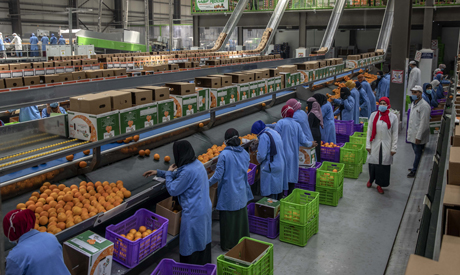
Workers assemble oranges for export at a factory in Alexandria / photo: AP
Increasing the country’s agricultural exports is one of the key targets of those responsible for economic policies in Egypt. The future depends on achieving a leap in exports, since these are a fundamental source of the foreign currency necessary for development.
The agricultural sector has the most potential to utilise Egypt’s natural and human resources to supply the local market with its needs, generate job opportunities, and attract more domestic and foreign investment.
Egypt’s agricultural strategy is also based on expanding and diversifying the production of crops, particularly fruit and vegetables, for export, since in these areas Egypt has a competitive edge in international markets.
The country’s agricultural exports were valued at $821 million during the first quarter of 2019, up from $812 million during the same period of 2018. Egypt’s agricultural exports also saw increasing international demand despite the Covid-19 outbreak.
Egypt exported 2.23 million tons of fruit and vegetables during the first quarter of 2020, rising to the first spot globally of countries exporting citrus fruit. Oranges topped the list of exports at 1.2 million tons to a value of $107 million, followed by 550,000 tons of potatoes in the first quarter of 2020 to a value of $14 million.
In 2018-19, citrus fruit made up 31 per cent of Egypt’s agricultural exports, followed by potatoes at 11 per cent, grapes at 10 per cent, and onions at nine per cent.
During the same fiscal year, Russia and Saudi Arabia came top of the list of countries importing agricultural produce from Egypt, at 12 per cent and 11 per cent, respectively. Following them came the Netherlands, the UK, each approximately at seven per cent, and China and Turkey, at five per cent each.
The crops that were hardest hit by the coronavirus crisis were those that were harvested during the peak of the pandemic, such as potatoes, the price of which dropped locally to LE1,200 per ton, while the cost per ton reached LE4,000. Meanwhile, the price of exported potatoes plummeted from $120 to $10 per ton.
Exports of fruit, regarded as non-essential items during times of crisis, were also affected, except for oranges due to the rising foreign demand for a fruit known as an immunity booster, especially against viruses.
The faster Egyptian exporters are able to access the money they are owed by the country’s Export Support Fund, the better Egyptian exporters will be able to direct their produce for export. Exporters have already collected 30 per cent of the money owed to them, helping companies to resume work and opening the door to more Egyptian exports.
There is a host of policies and measures that could be adopted to alleviate the impact of the coronavirus crisis on agricultural exports. The ministry of agriculture should play a greater role in informing farmers of international export standards through agricultural extension services and the media, for example.
Another measure could be to increase supervision by technical committees overseeing agricultural quarantining at border outlets, sea and land ports, and packaging stations in order to facilitate the monitoring process.
It would also be helpful to introduce a tracking system for crops planned for export during cultivation, packaging, and exporting in order to ensure the quality of products. It is key to give farmers adequate economic incentives, bearing in mind that they base their production and marketing decisions on costs and profits.
Maintaining the good reputation of Egyptian products is essential for exports to grow. Therefore, it would also be wise to apply punitive measures against exporting companies that do not abide by the standards Egypt has identified to ensure the quality of its exports.
All these policies will be effective if the government works on removing the obstacles that exporting companies may encounter, provides air transport of products to Arab and European countries at reasonable cost, and does not close packing facilities for agricultural products.
Another step would be to increase investment in small and medium-sized agricultural processing projects. Processing agricultural products increases their value-added, provides more job opportunities, and prolongs shelf life.
It is also important to increase communication with the Arab and western countries and sign protocols that ensure that in cases of litigation countries punish only the exporting company concerned and not all exporters. This measure would prevent the enforcement of bans on a wider scale and help to maintain the reputation of Egyptian products.
The writer is an associate professor of plant resources at Cairo University.
*A version of this article appears in print in the 16 July, 2020 edition of Al-Ahram Weekly
Short link: